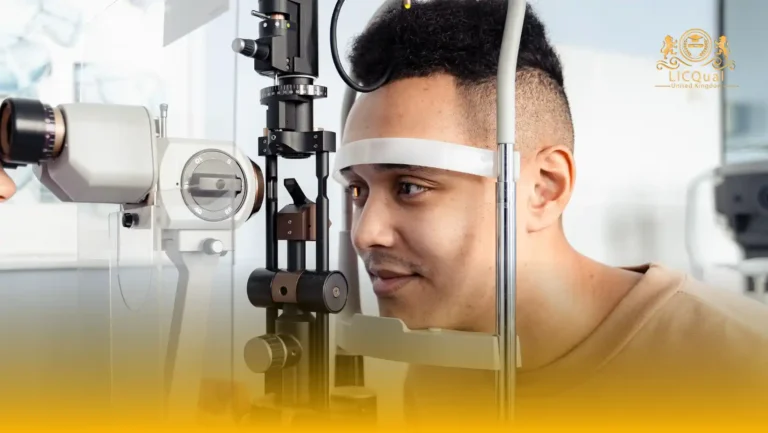The LICQual Level 3 Award in Food Safety is an advanced qualification designed for supervisors, managers, and those in positions of responsibility within the food industry. As food safety becomes an increasing concern globally, this internationally recognized certification empowers professionals with the knowledge and skills to lead safe, compliant, and hygienic food operations in accordance with best practices and global standards.
This course goes beyond basic food hygiene principles, offering in-depth training on food safety management systems, HACCP (Hazard Analysis and Critical Control Points), contamination prevention, microbiological hazards, and legal obligations. It is tailored for those who oversee teams or are involved in implementing and monitoring food safety policies within their organization.
Whether you’re working in food manufacturing, catering, hospitality, or retail, the LICQual Level 3 Award ensures that you are equipped to uphold high safety standards, conduct effective audits, and manage risks proactively. It is ideal for head chefs, quality control officers, shift supervisors, food handlers with leadership roles, and business owners who want to safeguard their reputation and customer health.
The course curriculum is developed by leading industry experts and reflects international food safety legislation and operational standards. Its structured, interactive format ensures learners engage with real-world scenarios, enabling them to translate theoretical knowledge into practical solutions within their work environments.
Achieving this qualification not only enhances your professional credibility but also positions you as a responsible leader in food safety. Whether you’re aiming for career advancement, organizational compliance, or operational excellence, the LICQual Level 3 Award in Food Safety is the strategic step forward in your professional journey.
The LICQual Level 3 Award in Food Safety provides an in-depth exploration of food safety practices required at supervisory and managerial levels. Designed for professionals who are responsible for developing, implementing, and monitoring food safety procedures, this qualification ensures a thorough understanding of safety controls and compliance strategies within food operations.
The course content includes a wide range of critical topics such as microbiological, physical, chemical, and allergenic hazards; food preservation techniques; temperature control; pest management; cleaning and sanitation systems; and food safety legislation. A strong emphasis is placed on the responsibilities of supervisors in promoting a positive food safety culture and ensuring team compliance.
Learners will gain practical knowledge of HACCP principles, risk assessment, and the implementation of food safety management systems in line with global regulatory frameworks. The course also prepares participants to conduct internal inspections and respond effectively to audits and enforcement actions, making it highly valuable for compliance officers and quality assurance personnel.
This course is delivered through engaging lectures, real-life case studies, and scenario-based assessments. It encourages critical thinking and leadership skills, ensuring that participants are prepared to make informed decisions that protect public health and uphold industry standards.
Upon successful completion, participants will receive the LICQual Level 3 Award in Food Safety, an internationally respected credential that demonstrates competence, authority, and commitment to excellence in food safety management. Whether you’re leading a team or running a food business, this qualification provides the expertise and confidence to elevate your role and contribute to safer food systems worldwide.
Course Overview
Qualification Title
LICQual Level 3 Award in Food Safety
Total Units
6
Total Credits
6
GLH
18
Qualification #
LICQ2200079
Qualification Specification
To enroll in the LICQual Level 3 Award in Food Safety ,applicants must meet the following criteria:
|
Qualification# |
Unit Title |
Credits |
GLH |
|---|---|---|---|
|
LICQ2200079-1 |
Food Safety Legislation and Regulations |
1 |
3 |
|
LICQ2200079-2 |
Food Safety Hazards and Control Measures |
1 |
3 |
|
LICQ2200079-3 |
Food Safety Management Systems |
1 |
3 |
|
LICQ2200079-4 |
Safe Food Storage and Temperature Control |
1 |
3 |
|
LICQ2200079-5 |
Cleaning, Sanitizing, and Pest Control |
1 |
3 |
|
LICQ2200079-6 |
Staff Training, Supervision, and Monitoring |
1 |
12 |
By the end of this course, learners will be able to:
1. Food Safety Legislation and Regulations
- Understand and explain the key food safety laws, regulations, and standards relevant to the food industry.
- Identify the legal responsibilities of food businesses and food handlers to ensure compliance with food safety regulations.
- Demonstrate knowledge of how food safety legislation impacts day-to-day operations in food establishments.
2. Food Safety Hazards and Control Measures
- Identify the different types of food safety hazards (biological, chemical, and physical) that may occur at various stages of food handling.
- Evaluate and apply appropriate control measures to prevent or minimize the risk of contamination in food production, preparation, and storage.
- Understand the concept of risk assessment and how to implement effective preventive actions for food safety.
3. Food Safety Management Systems
- Understand the principles of Food Safety Management Systems (FSMS) and their role in maintaining food safety standards.
- Explain the principles of Hazard Analysis and Critical Control Points (HACCP) and how it can be used to manage food safety risks.
- Develop the skills to implement, monitor, and review FSMS in food-related businesses to ensure continuous improvement in food safety practices.
4. Safe Food Storage and Temperature Control
- Understand the importance of correct food storage practices in preventing contamination and ensuring food safety.
- Demonstrate the ability to monitor and control food storage conditions, including proper temperature management, to prevent bacterial growth.
- Apply food storage principles to maintain food quality and safety in line with industry standards.
5. Cleaning, Sanitizing, and Pest Control
- Learn the importance of cleaning and sanitizing procedures in maintaining food safety and hygiene in the workplace.
- Identify effective cleaning and sanitizing methods and materials for various surfaces and food equipment.
- Understand pest control measures and how to implement them to maintain a hygienic environment, free from contamination.
6. Staff Training, Supervision, and Monitoring
- Recognize the importance of staff training in food safety practices to ensure a culture of safety within the workplace.
- Develop skills to supervise and monitor food safety practices within a team, ensuring compliance with food safety standards.
- Learn how to assess staff performance and provide effective feedback to ensure continuous adherence to food safety protocols.
This diploma is ideal for:
Assessment and Verification
All units within this qualification are subject to internal assessment by the approved centre and external verification by LICQual. The qualification follows a criterion-referenced assessment approach, ensuring that learners meet all specified learning outcomes.
To achieve a ‘Pass’ in any unit, learners must provide valid, sufficient, and authentic evidence demonstrating their attainment of all learning outcomes and compliance with the prescribed assessment criteria. The Assessor is responsible for evaluating the evidence and determining whether the learner has successfully met the required standards.
Assessors must maintain a clear and comprehensive audit trail, documenting the basis for their assessment decisions to ensure transparency, consistency, and compliance with quality assurance requirements.







